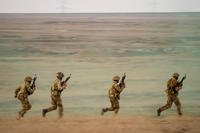The Veterans Affairs Department has been directed to report to Congress early next year on the findings of its Airborne Hazards and Open Burn Pit Registry, where veterans can detail health problems linked to exposure to burn-pits, oil well fires or other toxins or pollutants during deployments.
The directive was included in the recently passed omnibus appropriations bill by Sen. Tom Udall, a Democrat from New Mexico, who sponsored with Sen. Bob Corker, a Republican from Tennessee in 2013 legislation that created the registry.
The lawmakers acted after years of complaints that veterans of U.S.-led wars in the Middle East were incurring illnesses from exposures that were being untreated or misdiagnosed by the VA.
In 2011, the website Danger Room uncovered and published an Army memo based on an eight-year assessment of the air quality at Bagram Air Base, Afghanistan, stating that the "long term health risk associated with air conditions on BAF ... indicates there is a potential that long-term exposure at these levels may increase the risk for developing chronic health conditions such as reduced lung function or exacerbated chronic bronchitis, chronic obstructive pulmonary disease (COPD), asthma, atherosclerosis, or other cardiopulmonary diseases."
The Burn Pit Registry that went live in April 2014 takes reports from veterans and service members who served in Iraq and Afghanistan since the terrorist attacks of 9/11, as well as Djibouti, where the U.S. maintains Camp Lemonnier, a naval expeditionary base that is home to Combined Joint Task Force-Horn of Africa.
Veterans of the Persian Gulf War, known as Operations Desert Shield and Desert Storm, may also enter their exposures into the registry, as well as any veteran who served in the Southwest Asia theater after Aug. 2, 1990.
"Many of our servicemen and women were exposed to toxic fumes and chemicals from burn pits while serving our country overseas," Udall said earlier this week. "We don't know the long-term affects others will experience throughout their lives, but the burn pits registry was a first step."
Udall said the VA needs to keep working with and sharing data with the Defense Department to make sure Iraq and Afghanistan veterans "get the treatment they have earned. "
"And the VA's report, which is now required under law thanks to my work as a member of the Senate Appropriations Committee, will keep this process moving forward," he said.
In a statement Thursday morning the VA said it will "report to House and Senate appropriations committees within 180 days on matters connected to [burn pit registry], as well as other topics connected with potential toxic exposures in Iraq and Afghanistan. VA will of course respond to this directive."
The VA has issued two reports on data collected through the registry, the first covering the period April 25 through Sept. 30, 2014, and the second April 25 through Dec. 31, 2014.
But critics say the reports, while heavy on data, offer no conclusions.
"While the higher rates of illness statistics are noted, the actual link to the burn pits is still missing," said Ron Brown, president of the National Gulf War Resource Center. "Not exactly sure as to why a conclusion cannot be made based on research the VA has already. Like everything else with research it will always say more research is needed even after dozens of studies are conducted."
He added, "At some point, with enough research saying the same thing, the benefit of the doubt must be granted to the veterans."
Udall’s directive to VA comes even as the health consequences of burn pit exposure failed to make the 2016 list of peer-reviewed medical research programs that Congress requires the Pentagon to conduct.
Anthony Hardie, director of Veterans for Common Sense, expressed concern over the loss of the item in the list after being included in the 2015 legislation.
"There's nothing comparable," he said on Wednesday. "There’s very little research inside the [Department of Veterans Affairs]."
--Bryant Jordan can be reached at bryant.jordan@military.com. Follow him on Twitter at @bryantjordan.





























